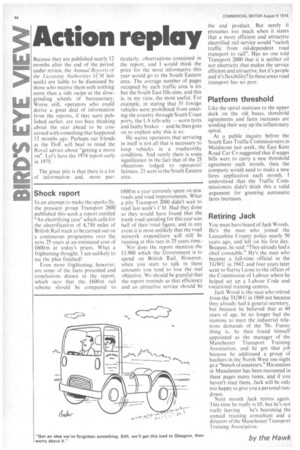Action replay
Page 46

If you've noticed an error in this article please click here to report it so we can fix it.
Because they are published nearly 12 months after the end of the period under review, the Annual Reports of the Licensing Authorities (CM last week) are liable to be dismissed by those who receive them with nothing more than a side swipe at the slowgrinding wheels of bureaucracy. Worse still, operators who could derive a great deal of information from the reports, if they were • published earlier, are too busy thinking about the year ahead to be concerned with something that happened 12 months ago. Perhaps our friends at the DoE will bear in mind the Royal advice about "getting a move on". Let's have the 1974 report early in 1975.
The great pity is that there is a lot Of information and, more par ticularly, observations contained in the report, and I would think the prize for the most informative this year would go to the South Eastern area. The average number of pages occupied by each traffic area is six but the South East fills nine, and this is, in my view, the most useful. For example, in stating that 31 foreign vehicles were prohibited from entering the country through South Coast ports, the I.A tells why -worn tyres and faulty brakes and he then goes on to explain why this is so.
He warns operators that servicing in itself is not all that is necessary to keep vehicles in a roadworthy condition. And surely there is some significance in the fact that of the 25 objections lodged to operators' licences, 21 were in the South Eastern area.
Shock report
In an attempt to make the sparks fly, the pressure group Transport 2000 published this week a report entitled "An electrifying case" which calls for the electrification of 4,750 miles of British Rail track to be carried out on a continuous programme over the next 25 years at an estimated cost of £600m at today's prices. What a frightening thought. I am unlikely to see the plan finished!
Even more frightening, however, are some of the facts presented and conclusions drawn in the report, which says that the £600m rail scheme should be compared to £600m a year currently spent on new roads and road improvements. What a pity Transport 2000 didn't wait to read last week's CM. Had they done SO they would have found that the trunk road spending for this year was half of their total figure, and in any event it is most unlikely that the road network expenditure will still be running at this rate in 25 years time.
Nor does the report mention the £1,900 which the Government is to spend on British Rail. However, when you start to talk in these amounts you tend to lose the real objective. We should be grateful that the report reminds us that efficiency and an attractive service should be the end product. But surely it presumes too much when it states that a more efficient and attractive electrified rail service would "switch traffic from oil-dependent road transport to rail". Has no one told Transport 2000 that it is neither oil nor electricity that makes the service efficient and attractive, but it's people and it's flexibility? In these areas road transport has no peer.
Platform threshold
Like the spiral staircase to the upper deck on the old buses, threshold agreements and fares increases are winding their way up the inflationary spiral.
At a public inquiry before the South East Traffic Commissioners in Maidstone last week, the East Kent Road Car Co suggested that if wages bills were to carry a new threshold agreement each month, then the company would need to make a new fares application each month. I understand that the Traffic Commissioners didn't think this a valid argument for granting automatic fares increases.
Retiring Jack
You must have heard of Jack Woods. He's the man who joined the Lancashire County police nearly 50 years ago, and left on his first day. Because, he said: "They already had a chief constable." He's the man who became a full-time . official in the TGWU in 1942, and four years later went to Sierra 1.eone to the offices of the Commission of Labour where he helped set up a Labour Code and vocational training centres.
Jack Wood is the man who retired from the TGWU in 1969 not because they already had a general secretary, but because he believed that at 60 years of age, he no longer had the stamina to meet the industrial relations demands of the 70s. Funny thing is, he then found himself appointed as the manager of the Manchester Transport Training Association, and he got that job because he addressed a group of hauliers in the North West one night as a "bunch of amateurs." His success at Manchester has been recounted in these pages many times, and if you haven't read them, Jack will be only too happy to give you a personal run-.
Next month Jack retires again. down,
e x
This time he really is 65, but he's not really leaving he's becoming the unpaid training consultant and a director of the Manchester Transport Training Association.
by the Hawk
































































































































